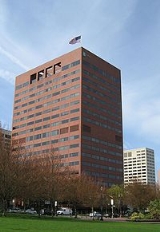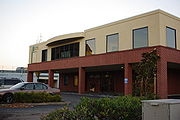
Umpqua Holdings Corporation
Encyclopedia
Umpqua Holdings Corporation is a financial holding company based in downtown Portland
, Oregon
, United States. Headquarters are in the Umpqua Bank Plaza
, formerly the headquarters of the Benj. Franklin Savings and Loan
. The firm has two principal operating subsidiaries, Umpqua Bank (the Bank), and Umpqua Investments, formerly Strand, Atkinson, Williams and York (Investments).
The company's three main operating segments are community banking, mortgage banking, and retail brokerage. The bank provides a range of banking, mortgage banking and other financial services to corporate, institutional and individual customers. Total loans outstanding, at December 31, 2006, were US$
5.3 billion, and total deposits were US$
5.8 billion. As of 2011, Umpqua Bank was the largest Oregon-based bank.
with six employees. It was started by a group of people working in the timber-logging business who wanted to create a means for their lumberjacks to cash their payroll checks.
On January 16, 2009, Umpqua agreed to assume the deposits of Vancouver, Washington-based Bank of Clark County after the latter bank was seized by the Office of the Comptroller of the Currency
.
On January 22, 2010, Umpqua agreed to assume the deposits of Seattle, Washington-based Evergreen Bank after being closed by the Washington Department of Financial Institutions and the FDIC (Federal Deposit Insurance Corporation
) was appointed receiver.
On February 26, 2010, Umpqua agreed to take over the deposits of Tacoma, Washington-based Rainier Pacific Bank, after it was seized by the FDIC (Federal Deposit Insurance Corporation
).
On March 4, 2010, Umpqua acquired the banking operations of Rainier Pacific Bank in a purchase agreement with the Federal Deposit Insurance Corporation.
Umpqua Bank stores also have a relatively flat administrative hierarchy. Bank stores consist of only one Store Manager, with all other employees being referred to as 'Universal Associates'. The execution of this concept was billed as removing the, "thats not my department," thinking of employees and empowering all associates with the ability to work in all areas of a traditionally specialized banking industry.
 The Company offers loans for business and commercial customers, including accounts receivable and inventory financing, equipment loans, real estate construction loans and permanent financing and small business administration (SBA) program financing. The Company also offers loan products for small businesses through its small business lending center. Commercial real estate lending is the primary focus of the Company's lending activities and a significant portion of its loan portfolio consist of commercial real estate loans. The Company provides funding for income-producing real estate, though a substantial share of its commercial real estate loans are for owner-occupied projects of commercial loan customers and for borrowers it has financed for many years.
The Company offers loans for business and commercial customers, including accounts receivable and inventory financing, equipment loans, real estate construction loans and permanent financing and small business administration (SBA) program financing. The Company also offers loan products for small businesses through its small business lending center. Commercial real estate lending is the primary focus of the Company's lending activities and a significant portion of its loan portfolio consist of commercial real estate loans. The Company provides funding for income-producing real estate, though a substantial share of its commercial real estate loans are for owner-occupied projects of commercial loan customers and for borrowers it has financed for many years.
Real estate loans are available for construction, purchase and refinancing of residential owner-occupied and rental properties. Borrowers can choose from a variety of fixed and adjustable-rate options and terms. Umpqua sells residential real estate loans that it originates into the secondary market. Umpqua also provide loans to individual borrowers, for a variety of purposes, including secured and unsecured personal loans, home equity and personal lines of credit, and motor vehicle loans.
Portland, Oregon
Portland is a city located in the Pacific Northwest, near the confluence of the Willamette and Columbia rivers in the U.S. state of Oregon. As of the 2010 Census, it had a population of 583,776, making it the 29th most populous city in the United States...
, Oregon
Oregon
Oregon is a state in the Pacific Northwest region of the United States. It is located on the Pacific coast, with Washington to the north, California to the south, Nevada on the southeast and Idaho to the east. The Columbia and Snake rivers delineate much of Oregon's northern and eastern...
, United States. Headquarters are in the Umpqua Bank Plaza
Umpqua Bank Plaza
Umpqua Bank Plaza is a 19-story tall office tower in Downtown Portland, Oregon, United States. Faced with red brick, the structure is tall and has of space. Opened in 1975 at a cost of $16 million, the building was designed by Wolff, Zimmer, Gunsul, Frasca . Originally named the Benjamin Franklin...
, formerly the headquarters of the Benj. Franklin Savings and Loan
Benj. Franklin Savings and Loan
Benj. Franklin Savings and Loan was a thrift based in Portland, Oregon, which was seized by the United States Government in 1990. In 1996 the United States Supreme Court found that this and similar seizures were based on an unconstitutional provision of the Financial Institutions Reform, Recovery,...
. The firm has two principal operating subsidiaries, Umpqua Bank (the Bank), and Umpqua Investments, formerly Strand, Atkinson, Williams and York (Investments).
The company's three main operating segments are community banking, mortgage banking, and retail brokerage. The bank provides a range of banking, mortgage banking and other financial services to corporate, institutional and individual customers. Total loans outstanding, at December 31, 2006, were US$
United States dollar
The United States dollar , also referred to as the American dollar, is the official currency of the United States of America. It is divided into 100 smaller units called cents or pennies....
5.3 billion, and total deposits were US$
United States dollar
The United States dollar , also referred to as the American dollar, is the official currency of the United States of America. It is divided into 100 smaller units called cents or pennies....
5.8 billion. As of 2011, Umpqua Bank was the largest Oregon-based bank.
History
South Umpqua State Bank was formed in 1953 in Canyonville, OregonCanyonville, Oregon
Canyonville is a city in Douglas County, Oregon, United States. The population was 1,293 at the 2000 census, while the 2007 estimate is 1,640 residents...
with six employees. It was started by a group of people working in the timber-logging business who wanted to create a means for their lumberjacks to cash their payroll checks.
On January 16, 2009, Umpqua agreed to assume the deposits of Vancouver, Washington-based Bank of Clark County after the latter bank was seized by the Office of the Comptroller of the Currency
Office of the Comptroller of the Currency
The Office of the Comptroller of the Currency is a US federal agency established by the National Currency Act of 1863 and serves to charter, regulate, and supervise all national banks and the federal branches and agencies of foreign banks in the United States...
.
On January 22, 2010, Umpqua agreed to assume the deposits of Seattle, Washington-based Evergreen Bank after being closed by the Washington Department of Financial Institutions and the FDIC (Federal Deposit Insurance Corporation
Federal Deposit Insurance Corporation
The Federal Deposit Insurance Corporation is a United States government corporation created by the Glass–Steagall Act of 1933. It provides deposit insurance, which guarantees the safety of deposits in member banks, currently up to $250,000 per depositor per bank. , the FDIC insures deposits at...
) was appointed receiver.
On February 26, 2010, Umpqua agreed to take over the deposits of Tacoma, Washington-based Rainier Pacific Bank, after it was seized by the FDIC (Federal Deposit Insurance Corporation
Federal Deposit Insurance Corporation
The Federal Deposit Insurance Corporation is a United States government corporation created by the Glass–Steagall Act of 1933. It provides deposit insurance, which guarantees the safety of deposits in member banks, currently up to $250,000 per depositor per bank. , the FDIC insures deposits at...
).
On March 4, 2010, Umpqua acquired the banking operations of Rainier Pacific Bank in a purchase agreement with the Federal Deposit Insurance Corporation.
Differentiation
Umpqua Bank has enjoyed some notability in the 21st century for its setup of bank branches. Traditionally, bank branches house back-office operations and administrators, along with secure deposit areas. Umpqua Bank's branches are called 'stores', with a greater emphasis on retail operations and atmosphere than traditional bank branches.Umpqua Bank stores also have a relatively flat administrative hierarchy. Bank stores consist of only one Store Manager, with all other employees being referred to as 'Universal Associates'. The execution of this concept was billed as removing the, "thats not my department," thinking of employees and empowering all associates with the ability to work in all areas of a traditionally specialized banking industry.
Current lending activities
The Bank makes both secured and unsecured loans to individuals and businesses. In December 2005, real estate construction/development, real estate mortgage, commercial/industrial and consumer/other loans represented approximately 16%, 63%, 19% and 2% respectively, of the total loan portfolio.
Real estate loans are available for construction, purchase and refinancing of residential owner-occupied and rental properties. Borrowers can choose from a variety of fixed and adjustable-rate options and terms. Umpqua sells residential real estate loans that it originates into the secondary market. Umpqua also provide loans to individual borrowers, for a variety of purposes, including secured and unsecured personal loans, home equity and personal lines of credit, and motor vehicle loans.

